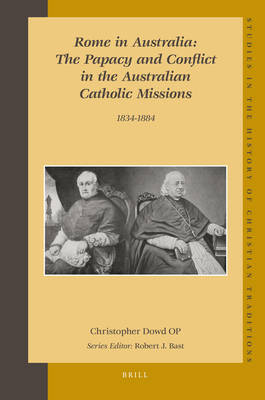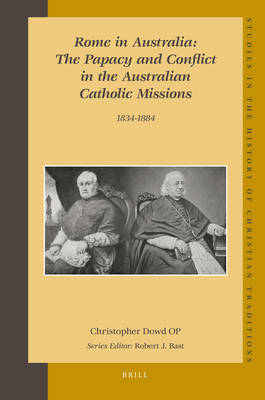
- Afhalen na 1 uur in een winkel met voorraad
- Gratis thuislevering in België vanaf € 30
- Ruim aanbod met 7 miljoen producten
- Afhalen na 1 uur in een winkel met voorraad
- Gratis thuislevering in België vanaf € 30
- Ruim aanbod met 7 miljoen producten
Zoeken
Rome in Australia: The Papacy and Conflict in the Australian Catholic Missions, 1834-1884 (Set 2 Volumes)
Christopher Dowd
€ 427,45
+ 854 punten
Omschrijving
The founding of the Catholic missions in Australia coincided with the defining drift of power and prestige within the nineteenth-century Church. This was a period of chronic dissension among Australia's Catholic communities, powerfully drawn by the ultramontane impulse and political manoeuvring to refer their problems to the Pope. Roman bureaucratic control, exercised through the Sacred Congregation de Propaganda Fide, was the single most important factor in the resolution of these problems and, consequently, in the determinative shaping of the colonial Australian Church. Based on extensive archival research, this study explores issues of process, politics and personality in the formulation of papal policy towards a part of the world that could not be more distant from Rome.
Specificaties
Betrokkenen
- Auteur(s):
- Uitgeverij:
Inhoud
- Aantal bladzijden:
- 302
- Taal:
- Engels
- Reeks:
- Reeksnummer:
- nr. 140
Eigenschappen
- Productcode (EAN):
- 9789004165298
- Verschijningsdatum:
- 25/07/2008
- Uitvoering:
- Hardcover
- Formaat:
- Genaaid
- Afmetingen:
- 170 mm x 244 mm
- Gewicht:
- 1406 g

Alleen bij Standaard Boekhandel
+ 854 punten op je klantenkaart van Standaard Boekhandel
Beoordelingen
We publiceren alleen reviews die voldoen aan de voorwaarden voor reviews. Bekijk onze voorwaarden voor reviews.








